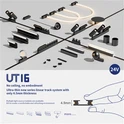Smart lighting refers to the use of distributed lighting control systems composed of technologies such as the Internet of Things, wired/wireless communication, power carrier communication, embedded computer intelligent information processing, and energy-saving control to achieve intelligent control of lighting equipment.
In recent years, relevant departments of the Chinese government have introduced a number of policies to support the development of the smart lighting industry. For example, the "Opinions on Accelerating the Comprehensive Green Transformation of Economic and Social Development" proposed to accelerate the energy-saving, water-saving and carbon-reducing transformation of existing buildings and municipal infrastructure, and promote advanced and efficient lighting, air conditioning, elevators and other equipment. In the "Notice on Several Measures to Promote Home Consumption", it was proposed to accelerate the research and development of home products such as smart home appliances, smart security, smart lighting, smart sleep, smart health care, and smart audio and video entertainment. In the "Notice on Issuing an Action Plan for Promoting the High-Quality Development of the Home Furnishing Industry", it was proposed to strengthen the quality comparison of key products such as smart home appliances, green furniture, and smart lighting with international high-quality products, and support enterprises to aim at advanced benchmarks for technical transformation and improve product quality. These policies have provided broad market prospects for the development of the smart lighting industry.








